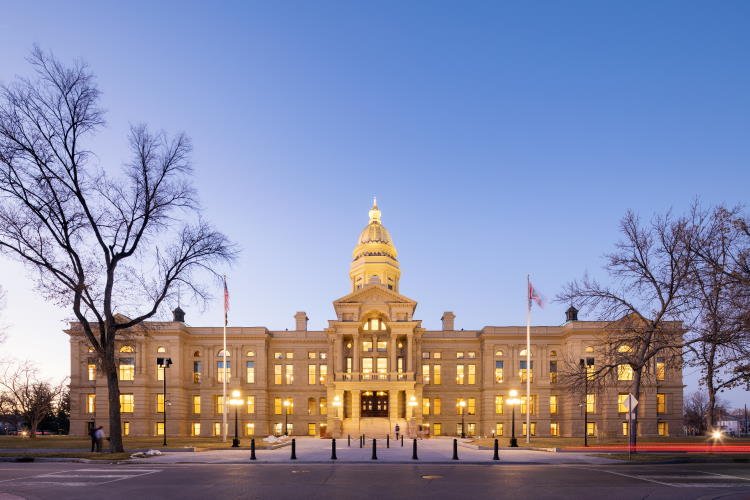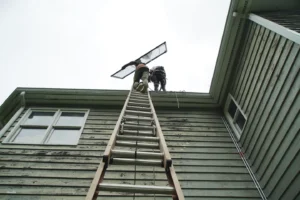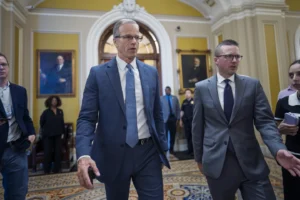PART 2 — Election Reform, New Public Measures and More: What to Watch in 2023 Legislative Session
The Wyoming Truth examines the key issues legislators will address during next year’s 40-day general session
- Published In: Politics
- Last Updated: Oct 03, 2022

Wyoming lawmakers will convene at the state capitol building in Cheyenne in January to enact legislation impacting a range of policy issues, including election reform and public safety. The Wyoming Truth examined all 77 of the state legislature's draft committee bills for next year's general session. (Photo via WyoLeg.gov).
By Jacob Gardenswartz
Special to the Wyoming Truth
Wyoming legislators will have a full plate when they return to the statehouse in January for a 40-day general session. As the Wyoming Truth previously detailed, lawmakers are exploring a number of major changes: expanding access to mental health services, helping alleviate home tax rates and addressing a budget crunch impacting public education.
But there’s even more that lawmakers will tackle during the upcoming general session, which takes place every odd year. (Even years are reserved for a session to determine the following year’s budgets.) Legislators hope to reform Wyoming’s election system, impose new measures to increase public safety and even incentivize more film production in the state.
Election Reform
Despite multiple assertions from state officials to the safety of Wyoming’s elections — and enhanced statewide audits finding 100% accuracy in the results of both the 2020 election and 2022 primaries — election security remains a top concern among Republican voters, evidenced by the election of Rep. Chuck Gray (R-Casper) as the GOP nominee for Wyoming Secretary of State. Gray campaigned heavily on unsubstantiated claims of election fraud, alleging that the 2020 results were “clearly rigged” and hosting multiple showings of a movie pushing unproven conspiracies of mass voter fraud.
As a result, lawmakers on the Joint Corporations, Elections and Political Subdivisions Committee are drafting a bill which would establish a separate state office to oversee elections, stripping those duties from the secretary of state.
“I’m concerned based on some of the rhetoric and some of the mailers I saw in regards to our most likely upcoming secretary of state that we may be in a precarious position when it comes to election administration for the next four years,” Rep. Dan Zwonitzer (R-Cheyenne), co-chair of the committee, said introducing the motion to draft the new bill. The measure would place the five top elected officers in the state — the governor, secretary of state, treasurer, auditor and superintendent of public instruction — in charge of overseeing the new office, along with a director selected by those officials.
Legislators are also exploring changes to the primary election system, including the introduction of ranked-choice voting, which enables voters to rank their top candidates for a given office rather than only choose one. If a candidate receives over 50% of the vote, they automatically win the election; if not, the top finishers head to a runoff.
Proponents of the ranked-choice model, which was adopted in Alaska and parts of Utah in recent years, argue the system enables a single election to determine the outcome of a race rather than requiring voters take two separate trips to the polls. They also note that allowing the top candidates to advance to a runoff regardless of their party eliminates the need for crossover voting, which featured heavily in the 2022 primaries.
But opponents are likely to argue that the ranked-choice system would weaken the power of state political parties; Corey Steinmetz, a Wyoming GOP National Committeeman, spoke out against the change.
Public Safety
During a September meeting of the joint judiciary committee in Casper, lawmakers explored several provisions to bolster public safety. Among them were two proposals which concerned drones, the small, unmanned aerial devices flown via remote control.
One draft bill would expand the definition of trespassing to make it a crime to fly a drone over private property when doing so would impact the “use and enjoyment of the land.” Committee members discussed the need to include certain exceptions for commercial use of drones, like when the device is used to photograph property for insurance purposes or to inspect infrastructure damage after a storm. Deliberations over how to draft such exceptions are ongoing.
A second, more controversial bill would make it a crime to fly a drone over a penal institution or correctional facility without prior authorization from prison leadership. Though certain exceptions would be allowed for government surveillance or satellite images, critics have raised concerns that the measure, if passed, would violate the First Amendment. Indeed, several Wyoming news organizations wrote a letter to the judiciary committee members urging them not to enact the legislation.
Another bill in discussion would change car seat laws. Currently, Wyoming law requires all children under age 9 to be in a car seat in the back seat of the vehicle, but the new measure would add that children under age 2 must be placed in a rear-facing safety restraint system, which studies have demonstrated are significantly safer than front-facing car seats for young children. The bill would also increase the penalties for violations of car seat rules.
Miscellaneous
Lawmakers throughout the legislature are weighing several measures that aren’t easily categorized.
As the U.S. Supreme Court debates the constitutionality of the Indian Child Welfare Act (ICWA), lawmakers are considering passing a law to enshrine certain parts of Wyoming tribal sovereignty. Currently, the federal law creates standards governing how Native American children, who are removed from their birth parents due to abuse or neglect, are placed with new families, prioritizing those who would enable the children to maintain a connection to their Indigenous heritage.
With advocates fearing that law may soon be overturned, Wyoming’s legislators are exploring how they might preserve its function in the state. One idea under discussion is to pass a so-called trigger law, similar to the one used to ban most abortions in Wyoming, which would go into effect only if the federal law is overturned.
On a brighter note, lawmakers are exploring ways to incentivize film production in the Equality State. A&E’s “Longmire,” a critically acclaimed Western crime drama, was set in Wyoming but filmed in New Mexico. A bill in consideration would establish a rebate program to provide tax incentives for production companies to actually shoot their programs in Wyoming.













